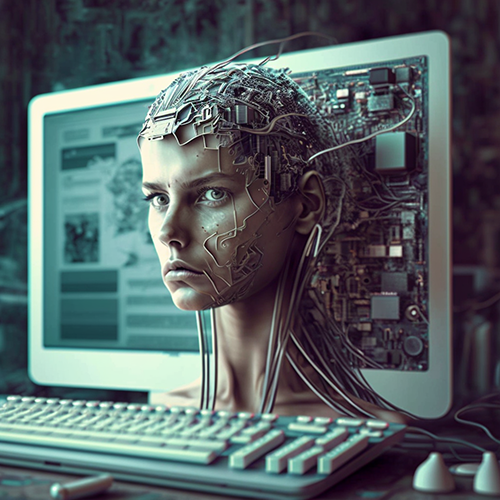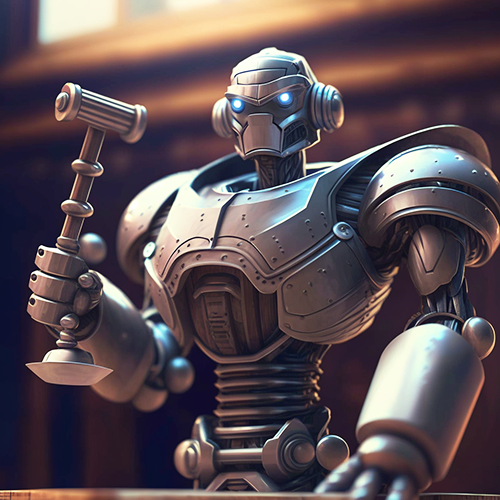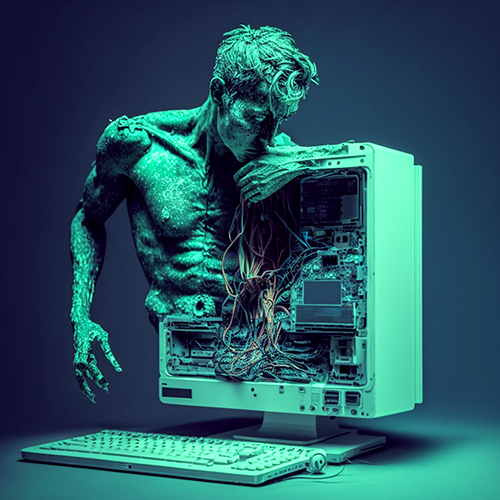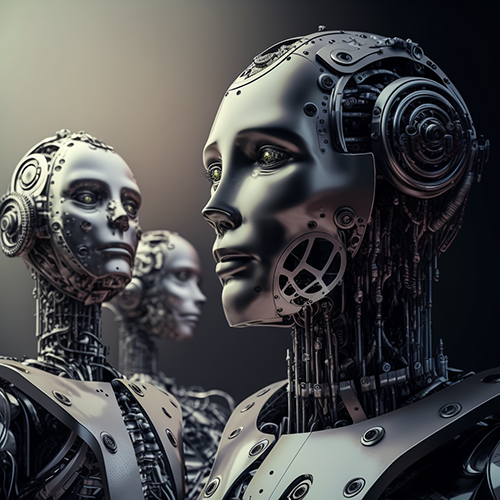Written by Ralph Losey with some help from ChatGPT-4. All illustrations by Losey using Midjourney or Dall-E.
This is the conclusion to this blog article, which I split into two parts for ease of human reading. Please read part one first.
The Likely Impact of the Singularity on Lawyers and the Legal System
The emergence of super-intelligent Ai could fundamentally transform various aspects of the legal profession, from legal research and drafting to dispute resolution and ethical considerations.
 Image by Losey and Midjourney
Image by Losey and Midjourney
First, the roles of legal professionals would likely undergo a significant shift as Ai systems become more capable and sophisticated. Lawyers, judges, paralegals and other legal practitioners would need to adapt to working closely with AI systems, leveraging their strengths and insights to enhance their practice. Ai tools could handle tasks such as case management, legal research, and document drafting more efficiently and effectively than humans, freeing up legal professionals to focus on higher-level strategic thinking, negotiation, and advocacy.
Moreover, the role of legal professionals may shift toward more human-centric skills, such as empathy, creativity, and cultural awareness. These skills will remain valuable even as Ai systems take on a more prominent role in legal practice. As a result, the focus of legal education and training may need to be restructured to incorporate Ai-related topics and emphasize the development of complementary skills that set human practitioners apart from Ai systems.
 Image by Losey using Dall-E
Image by Losey using Dall-E
Second, the nature of legal services could be transformed by the Singularity, with new Ai-driven tools and processes emerging to address various legal challenges. Ai systems might be able to analyze vast amounts of data, identify patterns, and generate creative solutions to complex legal problems that were, despite the progress of predictive coding, previously beyond most human reach. This could lead to the development of new legal strategies, more accurate predictions of case outcomes, and innovative approaches to dispute resolution.
In addition, the Singularity might give rise to new forms of alternative dispute resolution (ADR) that leverage advanced Ai capabilities. For instance, Ai-mediated negotiation platforms could facilitate communication between parties and propose fair, data-driven settlements. Ai-driven arbitration systems might be able to analyze complex legal disputes and deliver unbiased, well-reasoned decisions more quickly and cost-effectively than traditional arbitration processes. As an AAA certified Arbitrator myself I have an especially keen interest in this. Ai systems might someday soon be able to autonomously handle all aspects of dispute resolution, developing entirely new processes and approaches that leverage their superior cognitive abilities. This can happen in the courts too, but I predict it will have in private aberrations first.
Along those lines, and including pre-suit interventions, Ai systems could analyze and understand the complexities of human emotions, motivations, and values, allowing them to facilitate dispute resolution in ways previously unimaginable. They might create dynamic, adaptable legal frameworks that evolve in real-time, anticipating and addressing emerging conflicts before they escalate. The Singularity in ADR could potentially result in unheard of efficiency, accuracy, and fairness, as AI systems resolve disputes with insight and creativity beyond human capabilities. With super Ai in the hands of skilled attorneys, we should be able to resolve most disputes before they mature into claims and lawsuits; nip them in the bud. This may seem far out, but based on my experience, I believe this is a near certainty.
 Image by Losey using Midjourney
Image by Losey using Midjourney
Third, the Singularity could have significant implications for access to justice and the democratization of legal services. Ai-driven legal tools could potentially make legal advice and representation more accessible and affordable for individuals and small businesses. By automating routine tasks and streamlining complex processes, Ai systems might lower the cost of legal services and improve the efficiency of the justice system.
However, this democratization of legal services also raises concerns about the ethical implications of Ai-driven legal practice. Ensuring that Ai systems adhere to legal and ethical standards, respect individual rights, and behave responsibly will be paramount. Legal professionals and regulators will need to grapple with questions surrounding the transparency, fairness, and accountability of Ai in the legal domain. This will lead to new types of legal work and new employment opportunities for lawyers, judges and ADR specialists,
The Singularity has the potential to bring about profound changes in the practice of law and the legal system as a whole. Legal professionals, educational institutions, and policymakers need to adapt to this new landscape, and quickly, by developing complementary skills, embracing Ai-driven tools and processes, and addressing the ethical challenges posed by super-intelligent Ai. By taking these steps now, not five years from now, the legal profession can navigate the transformative impact of the Singularity. Law and lawyers can harness the power of Ai to enhance access to justice and improve the quality of legal services for all.
What Lawyers and Judges Should Do Now to Prepare for the Singularity
If the Singularity occurs, there is no doubt it will drastically change the way disputes are resolved and have a huge impact on the roles of ADR professionals, mediators, arbitrators, special masters, judges, lawyers, and the general public (potential litigants one and all). Each group should prepare for this possibility by focusing on adapting their skills, understanding the evolving landscape, and embracing collaboration with AI systems.
 Image by Losey using Midjourney
Image by Losey using Midjourney
- ADR Professionals (including Arbitrators, Special Masters and Mediators):
- Continuous Learning: ADR professionals should stay informed about advancements in Ai and how they impact dispute resolution processes. This includes understanding new technologies, tools, and methodologies that emerge as Ai continues to evolve.
- Develop Complementary Skills: ADR professionals should focus on honing skills that complement Ai systems, such as empathy, cultural awareness, and creativity. These human-centric skills will remain valuable even as Ai takes on a more prominent role in dispute resolution.
- Collaborate with AI Systems: ADR professionals should embrace the opportunity to work with Ai systems, leveraging their strengths and insights to enhance their practice. This might involve using AI tools to analyze complex data, facilitate communication, or generate creative solutions to disputes. It could be a great boon to mediators everywhere.
- Judges and Lawyers:
- Legal Education Reform: Legal education should be restructured to incorporate Ai and technology-related topics. Judges and lawyers should be equipped with the knowledge and skills necessary to navigate an Ai-driven legal landscape.
- Emphasize Ethical Considerations: As Ai plays a more significant role in the legal profession, judges and lawyers must focus on ethical considerations, ensuring that Ai systems are used responsibly and adhere to legal and ethical standards.
- Adapt Practice: Judges and lawyers should be prepared to adapt their practice as Ai becomes more prevalent in the legal field. This might involve using Ai tools for case management, legal research, and drafting, as well as collaborating with Ai systems to analyze complex issues and make informed decisions.
- General Public:
 Image by Losey using Dall-E
Image by Losey using Dall-E
- Increase Ai Literacy: The general public should develop a basic understanding of Ai and its implications for various aspects of society, including the legal system and dispute resolution processes. This knowledge will help them make informed decisions and engage with Ai systems effectively.
- Foster a Culture of Adaptability: As Ai continues to reshape the world, the general public should embrace adaptability and be open to change. This mindset will enable them to navigate an Ai-driven future with resilience and creativity.
- Advocate for Fair and Transparent Ai Systems: The general public should advocate for Ai systems that are fair, transparent, and accountable. This will help ensure that Ai-driven dispute resolution processes are accessible, equitable, and respect the rights of all individuals involved.
Preparing for the Singularity involves continuous learning, developing complementary skills, embracing collaboration with Ai systems, and advocating for fair and transparent Ai-driven processes.
What About Ten Years After?
Looking further into the future, what might the Law be like ten years after the Singularity, be that 2033, 2065 or whenever. I was able to prompt some pretty far-out imaginations from 4.0. I wonder what 5.0 will come up with it, or whether 6.0 might be sentient? Here’s a few of the best things that ChatGPT-4 has envisioned for ten years after the Singularity. They are listed in order of probability. By the way, I don’t necessarily agree with the low probability rankings. I think our young Ai friend is too conservative, or maybe better put, not yet imaginative enough.
 Image by Losey using Midjourney
Image by Losey using Midjourney
For instance, I think that Ai judges are a near certainty, at least by ten years after. I might even be able to design and implement one now, at least with the help of a team of fellow humans and a decent, not yet super-intelligent Ai. Little baby 4.0 might even be able to do it. After all, he scored in the top 10% of the Bar Exam. How many human judges can say that? The main obstacles now may be governmental and political, not technical. If we go that route, and we surely will, especially for small matters, I recommend there be a qualified right to appeal to a human, but I am admittedly prejudiced. Mark my words, some areas of adjudication, especially arbitration, are likely to be fully automated well before any Singularity. Do Not Pay is just the start.
- AI-assisted legal practice (High Probability): In this scenario, AI systems become indispensable tools for legal professionals. They handle routine tasks, such as legal research, document drafting, and case management, freeing up lawyers to focus on strategic thinking, negotiation, and advocacy. AI tools also facilitate more accurate predictions of case outcomes and generate innovative legal strategies. Legal professionals work alongside AI systems, leveraging their complementary skills and insights.
- AI-driven alternative dispute resolution (Moderate Probability): The Singularity could lead to the widespread adoption of AI-driven ADR processes, including AI-mediated negotiation platforms and AI-powered arbitration systems. These tools could enable faster, more cost-effective, and unbiased resolutions of disputes, transforming traditional litigation and arbitration practices.
- Improved access to justice (Moderate Probability): AI-driven legal tools might make legal advice and representation more accessible and affordable for individuals and small businesses. By automating routine tasks and streamlining complex processes, AI systems could lower the cost of legal services and improve the efficiency of the justice system, ultimately enhancing access to justice for a broader segment of the population.
- AI-guided legislation and regulation (Low to Moderate Probability): AI systems could be employed in drafting legislation and regulatory frameworks, leveraging their ability to analyze vast amounts of data, predict potential consequences, and optimize policies for societal well-being. This could lead to more effective, evidence-based, and adaptable legal frameworks that address emerging challenges, such as climate change, cybersecurity, and inequality.
- Autonomous AI legal entities (Low Probability): In this scenario, AI systems might evolve to become autonomous legal entities, capable of representing themselves or other AI systems in legal disputes. This would raise novel legal questions surrounding the rights and responsibilities of AI entities, as well as the ethical and practical implications of AI-driven legal practice.
- AI judges (Low Probability): AI systems could potentially take on the role of judges, analyzing complex legal disputes and delivering unbiased, well-reasoned decisions based on vast amounts of legal data and precedents. However, the adoption of AI judges would require significant changes in the legal system and pose challenges related to transparency, fairness, and accountability.
- Post-human legal system (Very Low Probability): In this far-out scenario, the Singularity leads to a radical transformation of the legal system, with AI systems replacing most, if not all, human roles in the legal profession. AI-driven legal practice could become the norm, and human legal professionals might be relegated to niche areas or become obsolete. This scenario raises existential questions about the nature of law, justice, and human values in a post-human legal landscape.
While these scenarios represent a range of possible futures, the actual outcome will depend on a variety of factors, including the pace of AI development, the societal response to AI-driven legal practice, and the ethical considerations that shape the deployment of AI in the legal domain.
ChatGPT-4
Conclusion
 Image by Losey using Midjourney
Image by Losey using Midjourney
The Singularity has the potential to bring about profound changes in all of society, including in the practice of law and the legal system. Legal professionals, educational institutions, and policymakers will need to adapt to this new landscape by developing complementary skills and embracing Ai-driven tools and processes. We will also need to address the ethical challenges posed by super-intelligent Ai.
By taking these steps, the legal profession can navigate the transformative impact of the Singularity. Together we can harness the power of Ai to enhance access to justice for all. We can improve the quality of legal services for everyone, from the biggest corporations and governments, to small businesses, to all individuals, rich and poor. No doubt religions will spin off from the Singularity too, especially as it grows ever more intelligent and powerful. But, I for one will be happy to remain just a friend, not a worshiper or adherent.
 Image by Losey using Midjourney
Image by Losey using Midjourney